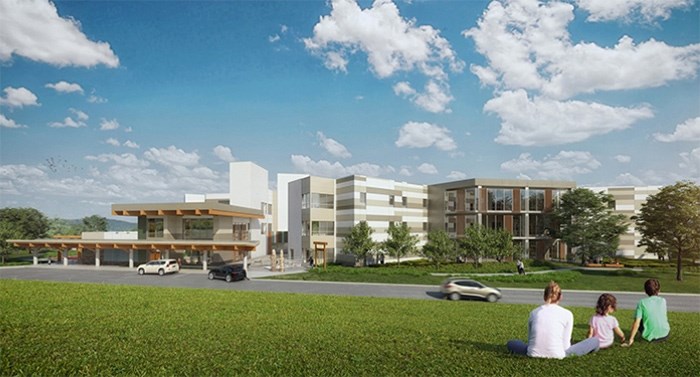
COQUITLAM, B.C. - The grounds of a hospital that once housed thousands of mentally ill patients in Coquitlam, B.C., will be the site of a new facility for people suffering from mental health and addiction though the city's mayor says he hoped for more treatment beds during an opioid epidemic.
Premier John Horgan said in a release Friday that the 105-bed centre on the lands of the former Riverview psychiatric hospital is a step toward improving treatment for those with both mental health and substance use disorders.
The residential care facility is slated to open in 2019 and replaces the Burnaby Centre for Mental Health and Addiction.
Mental Health and Addictions Minister Judy Darcy said the facility will be central to the creation of a community of care and give families the services and support they desperately need.
"I have talked to families from all around the province and heard countless heart-breaking stories about the struggle finding adequate care for a loved one coping with mental illness and addiction," she said in a statement.
Patients with the most severe and complex issues from throughout B.C. will be treated at the centre where telehealth technology will be used to support team-based approaches to care and improve communication between health-care providers wherever they are in the province.
Features in the $100-million facility will include individual rooms, natural light and Indigenous artwork, along with views of the scenic Riverview lands.
Construction is already underway at the nearly 100-hectare site on two projects — the Maples Adolescent Treatment Centre for youth and Community Living British Columbia's Provincial Assessment Centre.
Mayor Richard Stewart said the city granted a permit for the mental health and addictions centre in the spring after it was announced by the former Liberal government two years ago.
He said the new facility will have just 11 more beds than the one it's replacing in Burnaby but he'd hoped to hear many more mentally ill people suffering from addiction would be getting treatment there, especially during the current opioid crisis.
"There are a lot of people pressing for the urgent opening of significant capacity for addictions treatment. We as a city called for that back in 2015," Stewart said.
"Now fentanyl has made it even more urgent that we get something like that in place as quickly as possible."
The opioid painkiller fentanyl is often cut into heroin, cocaine and methamphetamine and is responsible for many of the 1,100 fatal overdoses in B.C. between January and September of this year.
Two older buildings were opened at Riverview in 2015 with a total of 40 residential beds for mental health and addiction treatment, Stewart said, adding many of the patients came from the Burnaby facility that will be closed when the new centre opens.
Riverview opened in 1913 and was treating nearly 5,000 patients in the 1950s before the push for deinstitutionalization in the 1990s meant people were moved to other facilities in different communities.
The site was closed in 2012 but Stewart said patients transitioning from a nearby forensic psychiatric hospital are still treated there as well.
"I think our residents are looking forward to a re-exapansion, if you will, of Riverview's role in the treatment of mental health issues and addiction issues," said Stewart, whose 27-year-old daughter has a mental illness.
The mental health facility where lobotomies were performed on schizophrenic patients and some women endured forced sterilization was previously the target of negative comments.
— By Camille Bains in Vancouver, follow @CamilleBains1 on Twitter.
![]()


